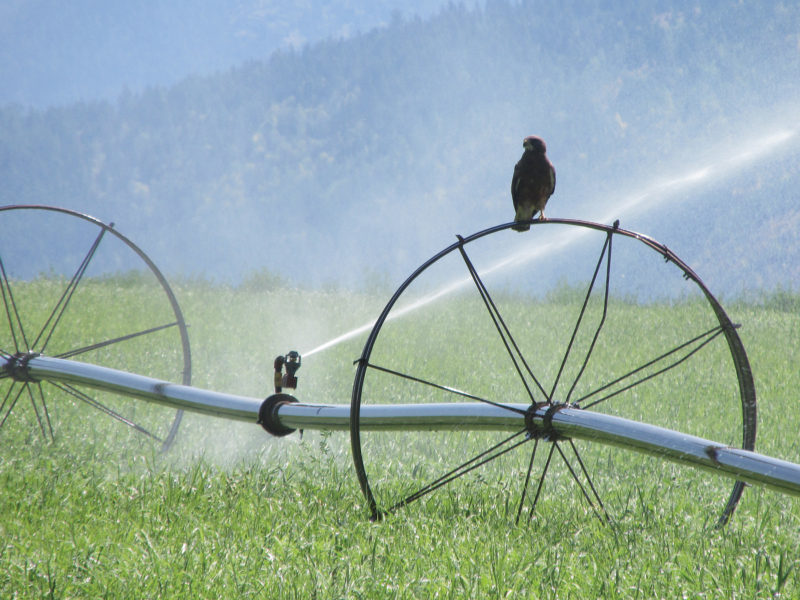BEAVERDELL – An analysis of nearly 500 groundwater licences the province has issued under the Water Sustainability Act reveals sharp inconsistencies in what’s being required of owners.
Sandra Ryan and partner Bill Di Pasquale are small-scale forage producers in Beaverdell. They registered their well and this past March received a conditional groundwater licence for a withdrawal of about 67,640 cubic metres a year.
However, they were surprised to discover among the conditions of the licence a requirement to “install a flow meter or other measuring device” and “retain the flow/measurement records for inspection upon request.”
“When we applied for the licence (as an existing user), there was absolutely no notice that this would be a condition to subsequently use the water. We, along with everyone else, were only told there would be retroactive water rental fee(s),” says Ryan, whose preliminary research showed that a flow meter would be “prohibitively costly.”
“A four-inch recording meter, flanges and other installation materials is in the range of $4,000. This does not include hiring a mechanical contractor to do the installation. So, at a bare minimum, this is a $5,000-plus venture.”
Ryan, who studied law, began to investigate the matter. Reviewing 475 of the 1,080 groundwater licences issued through the end of May to existing well users since the Water Sustainability Act took effect in 2016, she found that not all users are required to install a meter. While well owners in the Victoria and Nanaimo water districts are the least likely to be asked to install a meter, she discovered a case in the Vernon water district where two licences with identical parameters were issued. One owner required to have a flow meter and the other was not.
According to the BC Ministry of Forests, Lands, Natural Resource Operations and Rural Development, the conditions are at the discretion of the “statutory decision makers,” which in this case is usually the assistant water manager overseeing a given district.
“[They] have the discretion to add terms and conditions to the water licences, such as installing a flow meter. Once these terms and conditions have been met, then a final licence may be issued,” says FLNORD, which administers the application and licensing process.
Ryan also noted that one decision maker, who made 44 decisions of the 475 licences examined, always required the licensee to install a meter, irrespective of use or quantity. The minimum fee for a non-domestic water user is $50 a year, which amounts to a draw of up to 60,000 cubic metres a year. The decision maker required one licensee to install a flow meter for a licensed use of just 266 cubic metres a year.
“I fail to see how requiring a licensee to install a flow meter when they use 266 cubic metres of water/year for their livestock makes any sense whatsoever,” she said in a letter outlining her concerns to Ted White, comptroller of water rights for the province.
White replied, reiterating that any conditions attached to a licence, including the installation of a flow meter, was at the discretion of the assistant water manager. However, he said the province is open to making improvements.
“The Province is listening to user feedback on the system and is taking steps to make the process more user friendly and where it is challenging, FrontCounterBC staff are available to help,” he said.
Ryan has taken her concerns to the province’s environmental appeal board, a quasi-judicial body.
This is one option for licensees, says Mike Wei, an independent consultant who served as the province’s technical expert during development and implementation of the Water Sustainability Act and Groundwater Protection Regulation.
One reason for the inconsistencies between water districts is the discretion decision makers have, and the lack of a single standard for when to impose conditions or how to measure water use.
“There is no policy, that I am aware, regarding measuring and reporting and when to put it on a condition or not, and what is the acceptable measuring method. So each decision maker is kind of on their own,” he says.
One of the things his team looked at was alternative methods of estimating water use.
“Can you record time pump on, time pump off, and do that and, given how much you’re pumping, just calculate how much it is without buying additional infrastructure?”
This is an idea that appeals to the BC Cattlemen’s Association, which has taken a strong stand against water meters in discussions with government.
“We feel that there are other, less costly ways, to estimate that use,” says association assistant general manager Elaine Stovin, noting the province has no regulations governing measuring and reporting requirements. “What we’re saying is you don’t need a water meter to do that. You need a good relationship with the producer; you need to make a simple way for them to report that use.”
Good relationships will also encourage producers to embrace the new groundwater management regime, the intent of which Ryan generally supports. Requiring producers to measure water at some cost to themselves, and then not providing grants to assist with modernizing and upgrading equipment to achieve the goal of more efficient water use, doesn’t wash with her.
While some water districts have done a good job at letting producers know their options, Stovin says that’s clearly not the experience of most producers.


 Province expands slaughter licences
Province expands slaughter licences